Diesel Fuel
Diesel fuel (petroleum distillate fuel oil) is specifically designed for use in diesel engines whose fuel ignition takes place as a result of compression of the inlet air mixture and then injection of fuel without the need for a spark. Diesel fuel therefore needs good compression ignition characteristics.
The most common uses for Diesel fuel are freight and delivery trucks as well as trains, busses, boats, farm equipment, military vehicles, trucks, and some cars. Diesel fuel is also used in diesel engine generators to generate electricity. Many industrial facilities, large buildings, institutional facilities, hospitals, and electric utilities have diesel generators for backup and emergency power supply.
Diesel fuel can be produced over a widespread of boiling ranges, impacting the properties of the finished products and leading to widely different characteristics. ASTM D975 lists seven different grades of diesel and specifies test limits for each of them.
Sulfur content has been in the forefront due to the U.S. Environmental Protection Agency’s issued requirements to reduce the sulfur content of diesel fuel. Diesel fuel now sold in the United States for on-highway use is ultra-low sulfur diesel (ULSD), which has a sulfur content of 15 parts per million or less. Most diesel fuel sold for off-highway (or non-road) use is also ULSD.
Another measurement of great benefit to assure the cleanliness of fuel is ASTM D7619; Test Method for Sizing and Counting Particles in Light and Middle Distillate Fuels, by Automatic Particle Counter; which is based on the Seta Analytics AvCount particle counter.








